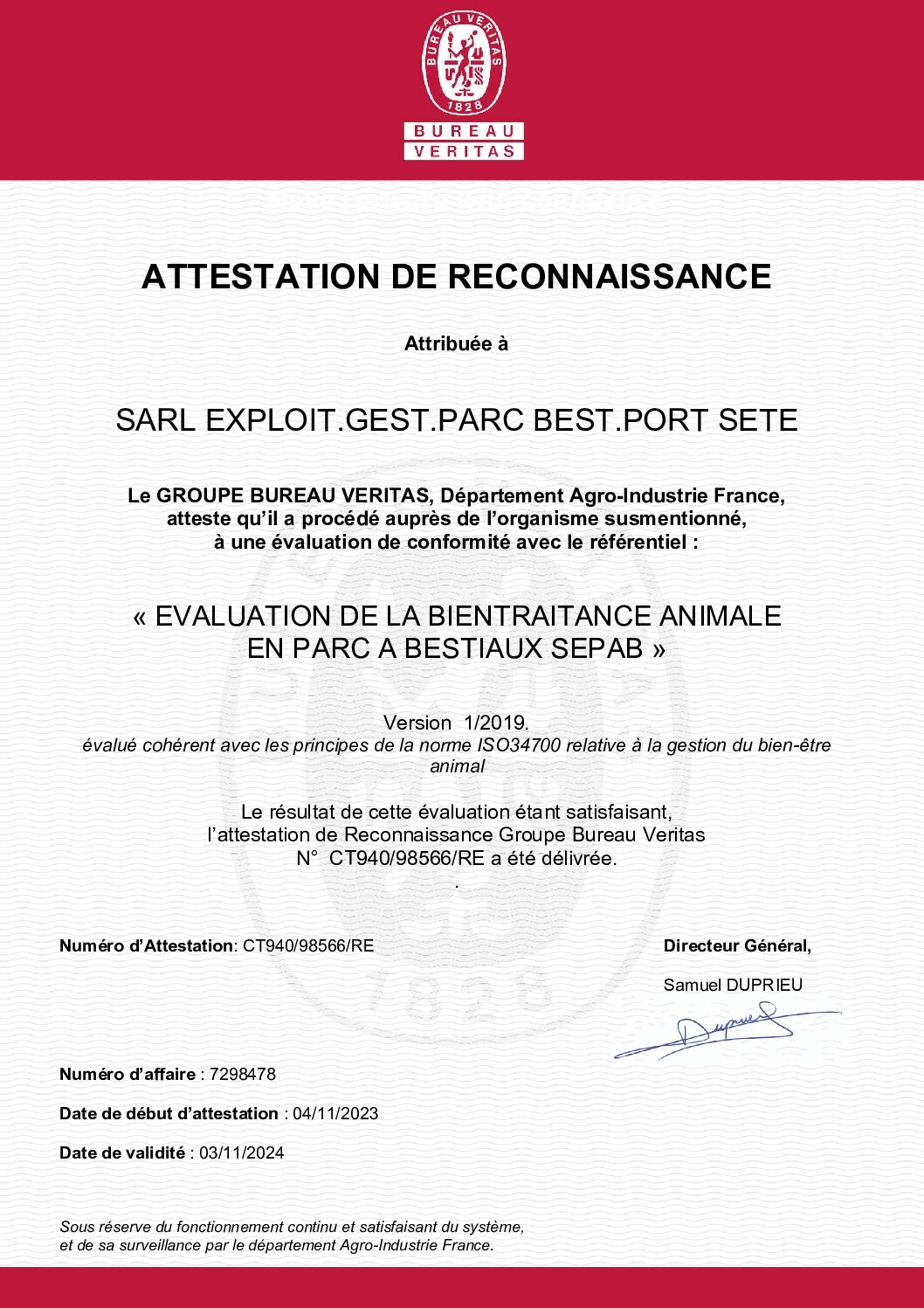Animal welfare
SEPAB is a world leader in animal welfare standards.
It is part of a continuous improvement of practices.
Certification
Our commitment to respecting animal welfare has enabled us in 2019 to become the only global reception center for animals controlled by the Bureau Veritas Group according to the SEPAB reference system, assessed as consistent with the requirements of the ISO34700 standard referring to to the management of animal welfare.
With 72 control points and 4 audits per year, we are continuously working to strengthen the best possible practices in animal health and welfare.
We are committed to guaranteeing compliance with best practices throughout the chain through communication and coordination between each actor in the sector, farmers, transporters, including exporters and all those taking part in export operations.
Passionate and proud to work tirelessly to improve animal welfare, we help guarantee an outlet for our breeders and secure the French breeding industry.
Frequently asked questions on animal welfare and the export sector
1. Are animals taken care of upon their arrival at the port of Sète?
Absoutely ! There are strict rules concerning the means to be implemented as soon as they arrive at the port.
For this, we guarantee each animal a supply of water and food at will and a suitable bedding as soon as they are unloaded from the trucks.
Support is provided by people trained in handling cattle and managing animal welfare. The vets make several rounds a day to check the livestock.
2. I hear a lot about stress and animal welfare how do you deal with it?
The concept of animal welfare is defined by the World Organization for Animal Health around 5 fundamental freedoms, universally recognized. These five freedoms describe the expectations of society with regard to the living conditions of animals when they are placed under the responsibility of humans, namely:
- Absence of hunger, thirst and malnutrition,
- Absence of fear and distress,
- Absence of physical or thermal stress,
- Freedom from pain, injury and disease, and
- Possibility for the animal to express the normal behaviors of its species.
We have therefore built an animal welfare management system, recognized by the Bureau Veritas Group, around these 5 freedoms. We guarantee an unlimited supply of water and food. Quality is our priority, for this we carry out an analysis of the potability of the water and ensure a supply of hay that meets the physiological needs of each animal. Thanks to a temperature and humidity recording system within our building, we are able, in the event that the animal no longer finds itself in its thermal comfort zone and may therefore be subjected to a stress, to implement alternative practices (ventilation by opening, reduction of density). A partnership with several veterinarians ensures the provision of care and continuous surveillance of the animals.
The standards for the reception of livestock within SEPAB are therefore superior to international standards in terms of animal welfare.
3. What are the control arrangements for your facilities and practices?
The animals are housed in a park with European approval which is subject to two inspections each year by the Departmental Directorate for the Protection of the Populations in order to check the state of compliance of the installations and practices.
4. Why export cattle?
From our proximity to the countries around the Mediterranean and our long-standing commercial relations with several importers, France exports live cattle and sheep.
Behind the export of livestock, we find more than 60,000 French farmers.
Importing countries have confidence in the health and quality of French livestock, but also in our animal welfare management system. With a supply capacity 365 days of the year, France is able to offer several breeds, each adapted to the breeding conditions of the importing country.
France supports the development of local processing sectors in importing countries.
Local processing of live animals is often less expensive than buying chilled or frozen meat slaughtered in France, an industry whose input costs are high compared to its global competitors.
Importing live meat is for third countries to overcome the major problem of breaking the cold chain.
Religious requirements, particularly around holidays, require the importation of live animals.

